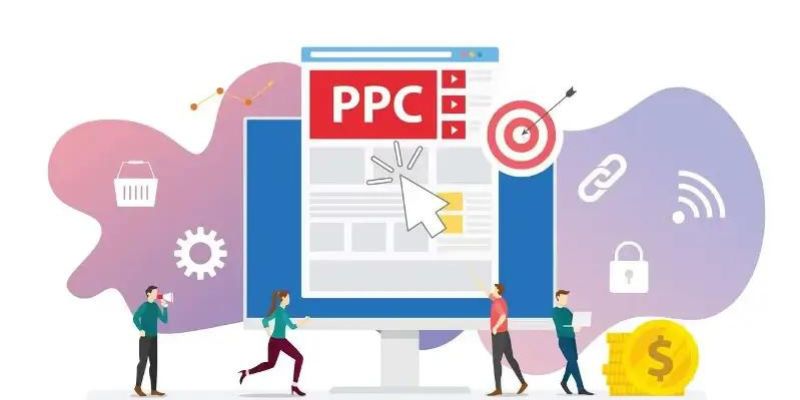The Top 5 Mistakes Small Businesses Make with Pay-Per-Click Advertising

The Dos and Donts of Crafting a Successful Social Media Strategy for E-commerce
October 31, 2023
Automated Test Result to Improve Accessibility
November 1, 2023Pay-per-click
(PPC) advertising can be a highly effective marketing strategy for small
businesses, providing a quick and measurable way to drive targeted traffic to
their websites.
However, many small businesses make costly mistakes that hinder the success of their PPC campaigns. From failing to define clear goals and target audiences to paying attention to mobile and local advertising opportunities, these errors can result in wasted budgets and missed opportunities.
In this article, we will explore the top five mistakes that small businesses often make with PPC advertising, and provide insights on how to avoid them. By understanding these common pitfalls and implementing best practices, small businesses can maximize the effectiveness of their PPC campaigns and achieve their desired results.
Lack
of Clear Goals and Target Audience
Not
Defining Clear Campaign Objectives
When it comes to pay-per-click advertising, small businesses often jump in without a clear plan. It’s like driving without knowing your destination. Without defined objectives, you’re just throwing money at random ads and hoping for the best. Take a moment to identify what you want to achieve with your campaign, whether it’s increasing brand awareness or driving sales.
Failing to Identify Ideal Target Audience
Imagine trying to sell snowboards to people who hate the cold. It’s a waste of time and resources. Many small businesses make the mistake of not understanding their target audience before launching a pay-per-click campaign. By identifying your ideal customer, you can tailor your ads to their interests, needs, and demographics. This increases the chances of conversion and ensures you’re not wasting money on irrelevant clicks.
Poor
Keyword Research and Selection
Neglecting Thorough Keyword Research
Choosing the right keywords is the foundation of a successful pay-per-click campaign. However, small businesses often rush through this step or rely solely on their intuition. Without thorough keyword research, you risk targeting irrelevant or highly competitive keywords that drain your budget. Take the time to understand what your audience is searching for and use tools to uncover valuable keywords.
Overlooking Long-Tail Keywords
Long-tail keywords are like hidden gems in the vast landscape of search queries. They may not have a high search volume, but they often have less competition and a higher likelihood of conversion. Small businesses often overlook these longer, more specific phrases in favor of broader keywords. By incorporating relevant long-tail keywords into your campaign, you can attract a more targeted audience and increase the chances of conversion.
Ineffective
Ad Copy and Landing Pages
Crafting Compelling Ad Copy
Unfortunately, small businesses often underestimate the power of persuasive and concise ad copy. They end up with generic, uninspiring ads that fail to catch the attention of users. Take the time to craft compelling ad copy that clearly communicates your unique selling proposition and entices users to click on your ad.
Creating Relevant and Engaging Landing Pages
Imagine clicking on an ad promising a discount, only to be taken to a landing page that has nothing to do with the offer. It’s like being left stranded in the middle of nowhere. Small businesses often neglect the importance of aligning their landing pages with their ads. Your landing pages should be relevant, and engaging, and seamlessly guide users toward taking the desired action. Make sure your landing pages have compelling headlines, clear visuals, and a strong call to action.
Insufficient
Monitoring and Optimization
Lack of Regular Performance Monitoring
Launching a pay-per-click campaign is not a “set it and forget it” endeavor. Many small businesses make the mistake of not monitoring their campaign’s performance regularly. Without tracking your metrics, you won’t know what’s working and what’s not. Make it a habit to analyze key performance indicators like click-through rates, conversion rates, and cost per click. By regularly monitoring your campaign, you can make data-driven decisions and adjust your strategy accordingly.
Failure to Continuously Optimize Campaigns
Optimization is the secret sauce to a successful pay-per-click campaign. Unfortunately, small businesses often neglect this crucial step. By analyzing your data and making adjustments, you can improve the performance of your ads and maximize your return on investment. Experiment with different ad variations, test new keywords and optimize your landing pages to improve your campaign’s effectiveness over time. Remember, the digital landscape is ever-changing, so continuous optimization is key to staying ahead.
Neglecting
Mobile and Local Advertising
Ignoring
Mobile Responsiveness and Optimization
Our smartphones are like our trusty sidekicks, always by our side, ready to assist us with anything and everything. So why do some small businesses still ignore the potential of mobile advertising? It’s like leaving your sidekick out in the cold while you embark on a daring adventure alone.
Ignoring mobile responsiveness and optimization is a big no-no when it comes to pay-per-click (PPC) advertising. If your website isn’t mobile-friendly, you’re basically telling potential customers to take their business elsewhere. Nobody wants to struggle with a website that looks straight out of the dial-up era on their shiny smartphone.
So, take the time to make your website responsive and easy to navigate on mobile devices. Optimize your landing pages for mobile so that your PPC ads lead to a seamless user experience. Remember, happy users mean more clicks and conversions!
Overlooking
Local Targeting Opportunities
Ah, the beauty of local advertising. It’s like having a secret weapon that allows you to target customers in your immediate vicinity. But for some reason, many small businesses seem to overlook this golden opportunity.
If you have a physical store or provide services in a specific area, local targeting can be a game-changer for your PPC campaigns. For instance, a coffee shop in Seattle would benefit greatly from targeting users searching for “best coffee in Seattle” or “coffee shops near me.” It’s all about reaching the right people at the right time, and local targeting gives you the power to do just that.
Don’t let this treasure trove of potential customers go unnoticed. Embrace local targeting in your PPC strategy and watch your small business soar to new heights. And hey, maybe you’ll even become the talk of the town!
In conclusion, avoiding these common mistakes in pay-per-click advertising can make a significant difference in the success of small businesses. By setting clear goals, conducting thorough keyword research, optimizing ad copy and landing pages, regularly monitoring and optimizing campaigns, and embracing mobile and local advertising opportunities, small businesses can enhance their PPC strategies and achieve better results.
With a well-executed PPC campaign, small businesses can effectively reach their target audience, drive more traffic to their websites, and ultimately, boost their overall business growth and success.



